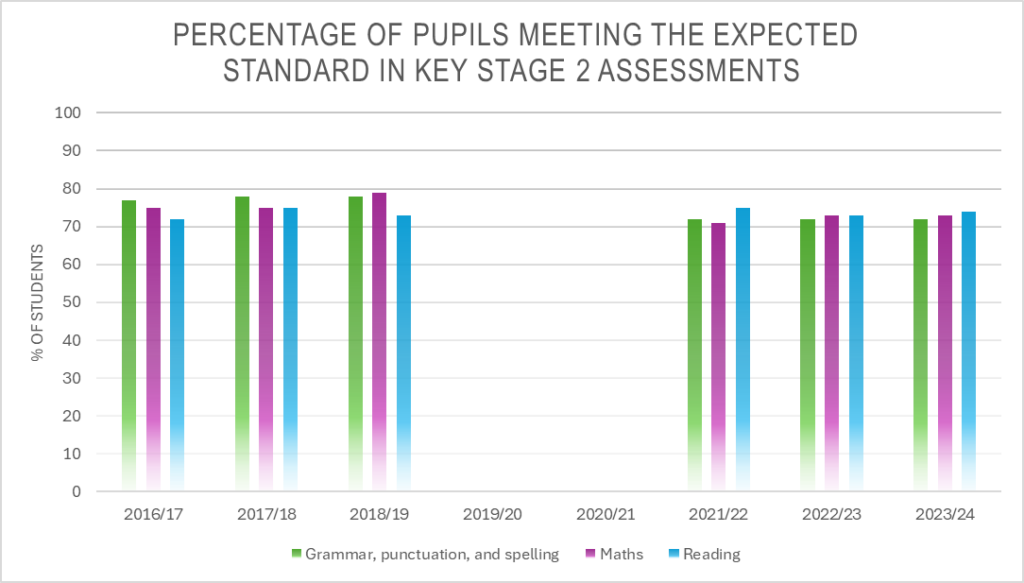

Learn everything you need to know about SATs results 2024 including KS1 & KS2 results and how SATs results are scored.

Author
Mhairi Sim
Updated
July 2024


Learn everything you need to know about SATs results 2024 including KS1 & KS2 results and how SATs results are scored.

Author
Mhairi Sim
Updated
July 2024


Learn everything you need to know about SATs results 2024 including KS1 & KS2 results and how SATs results are scored.

Author
Mhairi Sim
Updated
July 2024


Key takeaways
The KS1 and KS2 SATs have long been a key event in primary school calendars across England! These assessments are where students are tested on the national curriculum as they reach the end of their current stage before they move on to the following school year.
After sitting the SAT papers themselves, one of the most nerve-wracking parts of these assessments is awaiting the SATs results day! Students, parents, and teachers all look to the SATs scores to see if their learners are where they’re expected to be in their learning journey.
In this guide, we’ll explore how KS1 and KS2 SATs are marked, what the scores mean for our kiddos, as well as highlight important results dates for your diary!
The results are in! Now that the SATs results 2024 are available, let’s take a closer look at them and how they measure up to previous years.

Year 6 SATs results 2024 were released Tuesday, 9th July 2024. Each student’s scores were made available online for schools to view.
These results will be released to parents shortly, but definitely before the end of the summer term. The Department for Education’s KS2 attainment page has now also been updated with the headline facts and figures about what the 2024 results tell us about the assessment as a whole.
Later this year, in mid-December, the primary school performance table for 2024 will be published. These tables are used to show us how schools performed against others across the county in their KS2 SAT scores.
The table below shows the percentage of students whose results met the expected standard in the KS2 SATs over the last six years of assessments. Results are shown for each of the formally assessed areas of maths, English reading, and grammar, punctuation and spelling.
Here’s a closer look at the Year 6 SATs results 2024 showing the changes on the previous year:
| Subject/Paper | % of students who met the expected standard for KS2 in 2022/23 | % of students who met the expected standard for KS2 in 2023/24 | Increase/Decrease YoY |
|---|---|---|---|
| English reading | 73% | 74% | ↑ 1% |
| Grammar, punctuation & spelling | 72% | 72% | - |
| Maths | 73% | 73% | - |
It is suggested that although scores have risen, results for the last three years are lower than pre-pandemic levels, indicating that we are still in a period of recovery here. It is worth noting that the students sitting these KS2 SATs this year would have been in Year 2 and Year 3 when the pandemic hit.
Get 2 FREE weeks of Doodle this summer!
Use code 2_WKS_FREE to enjoy unlimited questions and games
Unlock unlimited maths questions
Put your learning into practice with fun exercises + games that are proven to boost ability!
Looking for more SATs practice? DoodleLearning is an award-winning maths and English app that’s filled with thousands of questions and games aligned to the national curriculum!
Designed by teachers, it creates each child a unique work programme tailored to their needs, doubling their progression with just 10 minutes of use a day.* Try it for free!

*Based on earning 24 stars a day in DoodleMaths. Read full study

Things look a little different this year for the KS1 SATs results 2024. This is due to a big change in the statutory requirements around this assessment that only came into effect this year.
As of this year, the KS1 SATs are no longer mandatory assessments and are instead, now optional. Each school will be able to decide on an individual basis if they would like their Year 2 students to take part or not.
In addition, this means that schools are also no longer obliged to report back the results of these assessments to the Department for Education. Moving forward, the results of the KS1 SATs will now just be for the school’s internal use only.
If a school had their Year 2 students sit the KS1 SATs, they may choose to report these results to parents, though there is no obligation for the school to do so. If your little one sat this assessment and you haven’t received results, you could reach out to your child’s teacher and ask how they did!
Maths and English reading are two areas of the KS1 SATs results that were reported previously. We’ve collated the last five assessments’ worth of scores which were reported in the graph below, including the maths and English KS1 SATs scaled scores 2023.

There was an improvement in both maths and reading in the KS1 SATs results 2023 here by 2% in each area. This could indicate that we may be on our way to returning to pre-pandemic levels!
Let’s take a closer look at what the SATs results 2023 and beyond look like!
The KS2 SATs results 2023, made available on the 11th of July, were scrutinised closely to assess schools’ ongoing recovery after the COVID-19 pandemic and were used to create the 2023 primary school performance table.
The table below shows the percentage of students whose results met the expected standard in the KS2 SATs over the last five years of assessments. Results are shown for each of the formally assessed areas of maths, English reading, and grammar, punctuation and spelling.

Here’s a closer look at the Year 6 SATs results 2023 showing the changes on the previous year:
| Subject/Paper | % of students who met the expected standard for KS2 | % increase/decrease on 2021/22 results |
|---|---|---|
| English reading | 73% | ↓ 2% |
| Grammar, punctuation & spelling | 72% | - |
| Maths | 73% | ↑ 2% |
It is suggested that as the results for the years 2021/22 and 2022/23 are lower than pre-pandemic levels, we are still in a period of recovery here. It is worth noting that the students sitting these KS2 SATs would have been in Year 3 and Year 4 when the pandemic hit.
Not all KS1 SATs results are reported in the same way as KS2 results. Instead of showing results per subject area, some of the results are combined with teacher judgments and the Phonics Screening Check pupils complete in Year 1.
Maths and English reading are two areas however that were reported. You can find the last five assessments’ worth of scores results in the graph below, including the maths and English KS1 SATs scaled scores 2023.

We saw an improvement in both maths and reading in the KS1 SATs results 2023 here by 2% in each area. This could indicate that we may be on our way to returning to pre-pandemic levels!
Maths and English reading are two areas however that were reported. You can find the last five assessments’ worth of scores results in the graph below, including the maths and English KS1 SATs scaled scores 2023.
The marking process for the KS1 and KS2 SATs differ due to the recent decision to make KS1 SATs optional assessments. KS1 SATs are therefore now marked in-house by teachers that are familiar with the students.
KS2 SATs are sent out of schools for external marking by specially trained SAT markers. The results are then available online for schools later in the year.
SAT exam scores are reported using scaled scores, but what exactly are scaled scores? Put simply, they’re a way of adjusting scores each year in a way that reflects the difficulty of the paper in order to make like-for-like comparisons between yearly results.
Scaled scores are calculated using a table, like this one, which are released each year. This table allows markers to equate a ‘raw score’ (or the actual number of correct marks achieved) to a scaled score.
The range of scaled scores that are awarded differs for each Key Stage assessment:
In each Key Stage SAT the scores are used to determine if students are working at the expected level for their year group. A score of 100 or more would indicate that a pupil is right on track!
Scores of 99 or less would tend to suggest that a student might benefit from some additional support as they progress onto the next year group and key stage.
SATs results are simply a way for schools to assess if a learner is where they’re expected to be at each stage of their learning journey. The scaled score informs their teacher next year whether they may need a little extra help (or challenge if their score is high!) as they move on.
There are no ‘passes’ or ‘fails’ here, just an opportunity to get the right support in place to ensure your learner is progressing!
If you have a Year 2 or Year 6 student who has their SATs on the horizon then you may want to help prepare them with some extra revision or practice! Let your learners try out our fantastic Doodle Learning maths app and English app and we’re sure they’ll love it!
The apps have thousands of fun curriculum-linked games and activities that they’ll enjoy so much, they’ll not even realise they’re revising! What better way to get them prepared and ready to take on their SATs?!
Try DoodleMaths for free!
Select a year group
Explore the number 10 in a variety of different ways using counting frames and more!
Discover everyday language used to talk about time.
Learn all about recognising, creating and describing patterns.
It is up to individual schools to release pupils’ SAT scores to parents and there is no other way to view these.
It’s worth noting that if your child sits the KS1 SATs, the school are not obligated to release the results, but you can request them.
For Year 6 students who have completed their KS2 SATs, their results will be available online for schools in early July. These scores will then be shared with parents before the end of the summer term.
If you have a Year 2 or Year 6 student who has their SATs on the horizon then you may want to help prepare them with some extra revision or practice! Let your learners try out our fantastic Doodle Learning maths app and English app and we’re sure they’ll love it!
The apps have thousands of fun curriculum-linked games and activities that they’ll enjoy so much, they’ll not even realise they’re revising! What better way to get them prepared and ready to take on their SATs?!
SAT scores of 100 or more indicate that a learner is performing at or above the expected level for their year group. This applies to both KS1 and KS2 SAT scoring.
To reach a scaled score, learners’ raw score (or the total mark they achieved in the paper) is converted using a scoring table like this one which was used in 2023.
The raw score is converted into a scaled score which makes it easier to compare the results of the SATs from year to year. This is because scaled scores take into account the difficulty of the paper and the performance of a year group overall.
The only average SAT scores which are reported are those for the KS2 SATs. The average KS2 SATs scaled scores 2023 are as follows and have remained the same for the last two years:
The highest score that can be achieved in the KS1 SATs is 115, and the highest score for the KS2 SATs is 120.
The Key Stage 1 SATs scaled score range is from 85 to 115.
The Key Stage 2 SATs scaled score range is from 80 to 1.
Lesson credits

Mhairi Sim
Mhairi is an experienced teacher, freelance writer and parent. After completing her bachelor's degree in Psychology, she graduated as a teacher from the University of Strathclyde. She then built experience teaching across KS1 and KS2 throughout the UK. In addition to working in mainstream education, Mhairi specialised in the additional support needs sector, including social, emotional, and behavioural support.

Mhairi
Mhairi is an experienced teacher, freelance writer and parent. After completing her bachelor's degree in Psychology, she graduated as a teacher from the University of Strathclyde. She then built experience teaching across KS1 and KS2 throughout the UK. In addition to working in mainstream education, Mhairi specialised in the additional support needs sector, including social, emotional, and behavioural support.
Book a chat with our team
If you’d like to use Doodle’s browser version, please visit this page on a desktop.
To log in to Doodle on this device, you can do so through our apps. You can find out how to download them here: